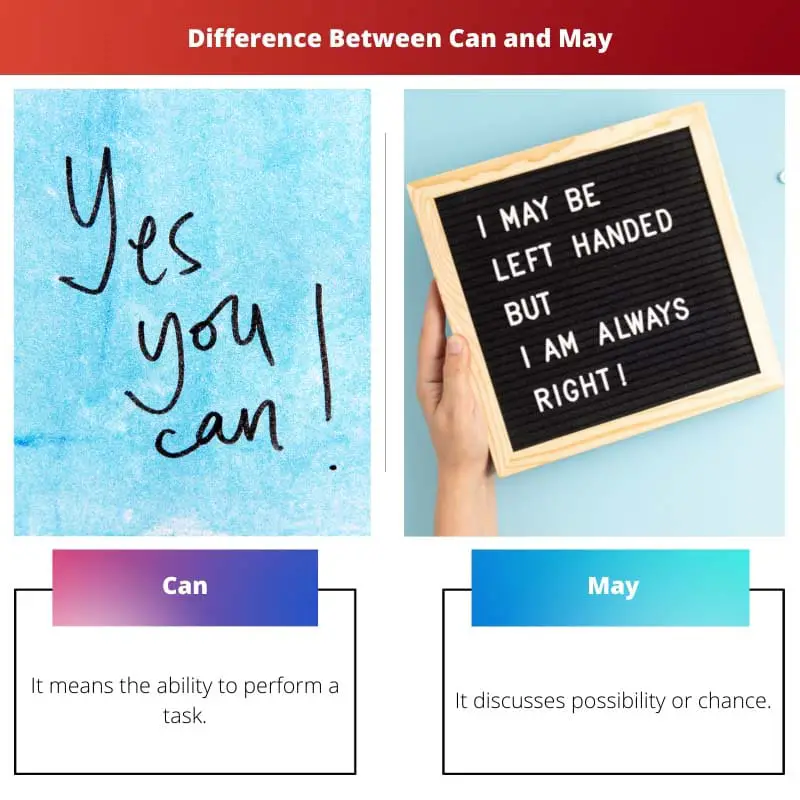We all are surrounded by various languages. French, German, Spanish, English, and many more languages a different sets of words, but the meaning remains the same if we translate.
If we talk about English, it’s the accepted norm worldwide. To establish a network with strangers, it is essential to know English.
Key Takeaways
- Can implies that the person can do something, while may imply permission.
- Can is used for expressing ability, possibility, or permission in informal situations, while may is used for formal or polite situations to ask for permission or make a request.
- Can is used to express a general truth or habit, while may is used to talk about specific instances or situations.
Can vs May
“Can” refers to the ability to do something or to have permission to do something, and it is used to indicate that someone can do something or is allowed to do something. “May” is used in more formal contexts to ask for or give permission formally or politely.

The word ‘can’ is one of the auxiliary verbs explaining a thing or an action that can be done. Also, it means doing something that seems relatively informal or when someone allows you to do a specific task.
On the other hand, the word ‘may’ is also an auxiliary verb that means to talk about chances or possibilities of happenings. Also, it can be used to give some permission or seek something for doing something.
Comparison Table
| Parameters Of Comparison | Can | May |
|---|---|---|
Meaning of word | It means the ability to perform a task. | It discusses possibility or chance. |
| Grant | It could be granted sometimes. | It’s like a certain thing or a sure thing. |
| Tone | It’s informal in nature. | It’s formal. |
| Nature wise | It simply defines possibility, so it’s an expression. | It is a possibility that it’s vital in nature. |
| Examples | Can I go to the washroom? I can come with you. We can reach on time. All of us can pray. | May I go with him? I may come tomorrow. I may not be able to do this till midnight. May you succeed every time. |
What is Can?
It’s part of the English language which has a meaning and makes sense when appropriately used in an English sentence. It’s an auxiliary verb that indicates a possibility, or anything happening is possible.
It denotes the ability of a person. It’s also used to examine a case of an informal task to be entertained.
The usage and implementation part remains vital because it could change the meaning if used in an inappropriate situation.
For example, a boy seeking permission to go to the washroom and asking the teacher, he says, ” Mam, can I go to the washroom?”.
It will mean that he’s capable of going to the washroom or not as if he doesn’t know if he can.
Can is an informal part of speech that is ability-based. The tone is conversational. It seems a simple thing when used in a sentence. The negative aspect of the can is Can’t.
This displays when the ability to do or to be done doesn’t work.
Some examples we consider will be.
“Can I play the Guitar?”
“I can’t attend the meeting since it’s late.”
“I can walk 2 miles in 15 minutes.”

What is May?
The word may is a modal or auxiliary verb that describes the possibility of things happening boldly. Also, the term may is heavier wise.
Also, the permissions or granting something while may is used higher chances to be executed.
This word was used in some manuscripts from the 8th century. It indicates a strength or power nature-wise, which was changed to a strong possibility or chance. If we see some examples related to the word, it will be:
“There may be a storm today.”
“If you do the task, you may expect a promotion.”
“May you win all races of life.”
“You may come tomorrow morning.”
“I may not go tomorrow.”
The word may is quite dominating in nature. May is a formal tone as well. Also, when used in a sentence, the chances of affirmation are higher. The word may also seem quite happening or a strong possibility.

Main Differences Between Can and May
- The word can mean the ability of a task that can be done or a person’s capability, but the word indicates the possibility of a job that exists and the chances of happening.
- The term may is formal in tone, and the chances of yes or affirmation are quite more, whereas the word can is informal, and the chances are pretty less.
- The word may have been seen used centuries back. Many manuscripts have used sentences that used may, but can is quite a new word as compared to the term may
- May is not an expressible word, whereas the word can is expressible. Since May is formal, it’s not that type, but ‘can’ is informal tone-wise. May is strong as well compared to the latter one.
- Some examples of sentences using may are “May I go to the park?”, ” I may come tomorrow to discuss the agenda.”, ” May you win this match.”, ” I may go by walking”. Examples of sentences using can are “I can come tomorrow.”, ” Can I run 10 miles in one go?” or ” I can do this task”.

Last Updated : 11 June, 2023


Emma Smith holds an MA degree in English from Irvine Valley College. She has been a Journalist since 2002, writing articles on the English language, Sports, and Law. Read more about me on her bio page.

This post did a great job at differentiating ‘can’ and ‘may’, but it lacks a conversational aspect. Engaging the readers more would be beneficial.
I agree, a more conversational tone could make the post more relatable.
Interesting read, but I feel a more humorous approach could have made it less dense.
I see your point, but I think the serious tone was necessary to emphasize the distinctions between ‘can’ and ‘may’.
I appreciate the detailed explanations. It’s high time we get a proper understanding of these words.
I couldn’t agree more! This post has been very helpful.
Absolutely, the article is a great source of information and it really delves deep into the nuances of ‘can’ and ‘may’.
While it’s an interesting read, I think the article might have gone too in-depth for some readers. Maybe a more concise version could be beneficial.
I see your point, but the depth of the explanations is what I find valuable.
I understand where you’re coming from, but I think the level of detail is necessary in order to truly grasp the differences.
Great explanations! Though I think the post could use a more light-hearted approach to engage the readers better.
I understand your view, but I think the seriousness of the content required a more formal tone.
I agree with you, but the formal tone maintains the integrity of the explanations.
Great post! Very informative and well-explained. The comparison table really helps in understanding the differences.
I agree! This article really clarifies the confusion between ‘can’ and ‘may’. It has been bothering me for some time now.
This post is extremely informative and well-researched, but it seems a bit too formal for my liking. A more casual tone might have made it more engaging.
I can see what you mean, but I believe the formality adds to the credibility of the content.
I think the formal tone suits the nature of the topic. It maintains the seriousness of the subject matter.
This article is highly educational. The examples provided are quite helpful in understanding the differences clearly.
Agreed! The article has been of great educational value.
I found the examples to be very illuminating. The article is commendable.
The examples really helped in solidifying the understanding of ‘can’ and ‘may’. This article has been very beneficial.
I completely agree! The examples are indeed very effective.
The article is a great resource for those who need clarity on these issues.
A very insightful article! The detailed descriptions really help in understanding the nuances of the words ‘can’ and ‘may’.
I couldn’t agree more! The post was extremely insightful.